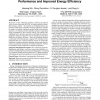2191 search results - page 10 / 439 » Improving the Efficiency of Non-Deterministic Computations |
CODES
2004
IEEE
13 years 11 months ago
2004
IEEE
We present a CPU scheduling algorithm, called Energy-efficient Utility Accrual Algorithm (or EUA), for battery-powered, embedded real-time systems. We consider an embedded softwar...
MOBIHOC
2009
ACM
14 years 8 months ago
2009
ACM
Due to its low complexity, Greedy Maximal Scheduling (GMS), also known as Longest Queue First (LQF), has been studied extensively for wireless networks. However, GMS can result in...
FPL
2006
Springer
13 years 11 months ago
2006
Springer
FPGAs have reached densities that can implement floatingpoint applications, but floating-point operations still require a large amount of FPGA resources. One major component of IE...
GCC
2007
Springer
14 years 1 months ago
2007
Springer
The Message Passing Interface (MPI) is a standard in parallel computing, and can also be used as a highperformance programming model for Grid application development. How to execu...
VLSID
2002
IEEE
14 years 8 months ago
2002
IEEE
This paper considers reducing the cost of test application by permuting test vectors to improve their defect coverage. Algorithms for test reordering are developed with the goal o...

